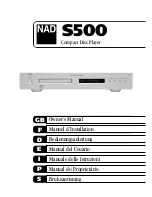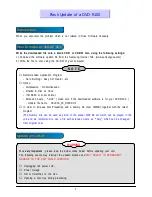
USER MANUAL - DUAL ZONE AV MEDIA PLAYER EQUIPMENT ACT550
– ACT550/DAB+
480258-4.0
18/01/2021
Page 13 / 34
© ACTIA “Any reproduction of this document, even partial, is strictly forbidden without written authorisation”.
POL. IND. “LOS OLIVOS”
C/ CALIDAD, 66
28906 GETAFE
Tel: +34 91 665 26 26
Fax: +34 91 665 23 24
N.I.F. ES-A-28905065
4.9. How the Reception of Radio Works
AM, FM and
DAB+ radio signals are broadcast from transmitter towers located around your city.
They are intercepted by the radio antenna on your vehicle. This signal is then received by the radio and
sent to the vehicle speakers.
When a strong radio signals has reached the vehicle, the precise engineering of your radio system
ensures high quality reproduction. However, in some cases the signal coming to the vehicle is not strong
and clear. This can be due to factors such as the distance from the radio station, closeness of other
strong radio stations or the presence of buildings, bridges or other large obstructions in the area.
AM and
DAB+ signals reception is usually better than FM reception:
In the case of the AM signal, radio waves are transmitted at low frequency. These long, low
frequency radio waves can follow the curvature of the earth rather than travelling straight out into
the ionosphere. In addition, they curve around obstructions so that they can provide better signal
coverage.
In the case of the DAB+ signal, the compression and coding system used to convert the
analogue signal into a digital signal makes the transmission immune to interference caused by
buildings, mountains or atmospheric conditions that normally disturb the reception of the FM
signal.
Because of this, clear AM and
DAB+ broadcasts can be clearly received at greater distances than
FM broadcasts.
Figure 6
– AM and
DAB+ Reception
FM broadcasts are transmitted at high frequency and do not bend to follow the earth’s surface. Because
of this, FM broadcasts generally begin to fade at short distances from the station. Also, FM signals are
easily affected by buildings, mountains, or other obstructions.
Figure 7
– FM Reception















































